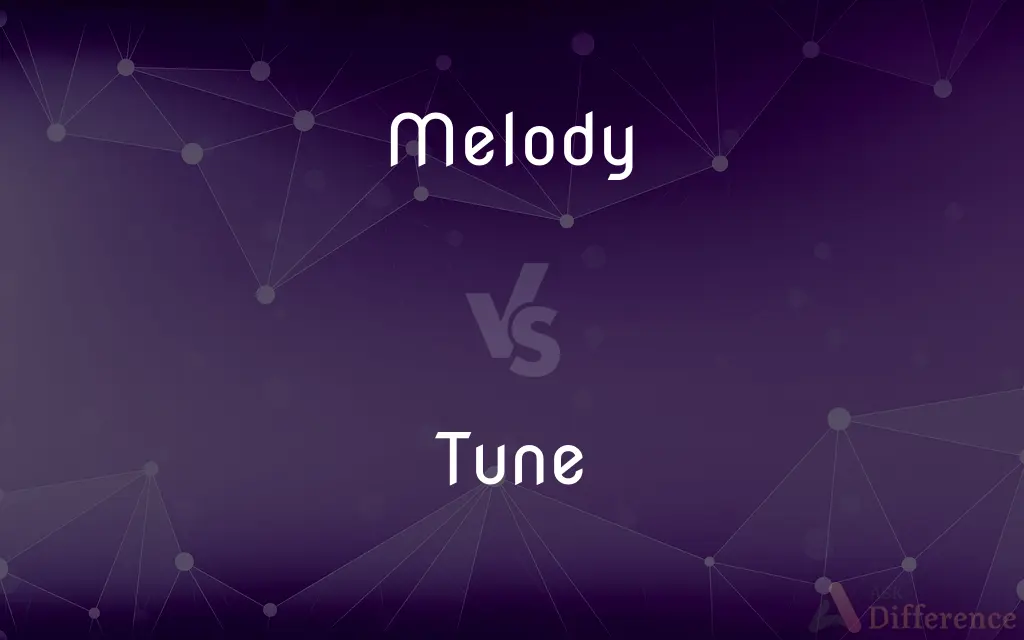Melody vs. Tune — What's the Difference?
By Tayyaba Rehman — Updated on September 15, 2023
Melody is a sequence of musical notes that creates a distinct musical phrase, usually the focal point of a composition. Tune is a simpler, catchier version of a melody, often easy to sing or whistle, and sometimes considered more colloquial.

Difference Between Melody and Tune
Table of Contents
ADVERTISEMENT
Key Differences
Melody is a musical term that refers to a sequence of notes arranged in a specific manner to form a distinct, cohesive musical phrase. It's usually the element in music that people remember and hum. Tune, on the other hand, often refers to a simpler, more straightforward series of notes, generally easier to sing or whistle. It's a term commonly used to refer to popular or folk songs.
Melody is considered a foundational element in complex musical compositions. It serves as the backbone, around which other musical elements like harmony and rhythm are built. Tune usually stands alone and is designed for its catchiness and ease of recall. It often doesn't require the same level of complexity in harmonization or arrangement as a melody does.
In musical terminology, Melody is generally more formal and is often analyzed in terms of its scale, mode, and intervallic construction. Tune tends to be used in a more informal sense, like in everyday conversation about a catchy song heard on the radio. In essence, all tunes are melodies, but not all melodies are tunes.
Grammatically, both Melody and Tune are nouns. They can be modified by adjectives ("a haunting melody," "a catchy tune") and can also be used as verbs, although more rarely ("he melodized the poem," "she tuned her guitar"). Despite their syntactic similarities, their semantic differences are noteworthy. Melody usually implies a level of musical sophistication, whereas Tune often suggests simplicity and accessibility.
Comparison Chart
Complexity
Usually more complex
Generally simpler
ADVERTISEMENT
Context
More formal, academic settings
More colloquial, everyday settings
Musical Role
Often part of larger compositions
Usually stands alone
Required Elements
May involve complex harmonization
Often does not require complex harmonization
Grammatical Usage
Noun, can be used as a verb
Noun, can be used as a verb
Compare with Definitions
Melody
A sequence of musical notes forming a distinct phrase.
The melody of the song was hauntingly beautiful.
Tune
A simple, catchy series of musical notes.
The tune was so catchy that everyone started humming it.
Melody
A linear succession of tones perceived as a single entity.
The composer's melody was groundbreaking.
Tune
A specific arrangement of musical notes to form a song.
He wrote a tune that became a hit.
Melody
The principal part in harmonized music.
The soprano carried the melody in the choir.
Tune
A harmonized melody.
The tune was beautifully harmonized.
Melody
The tune identified with a specific piece of music.
The melody stuck in my head for days.
Tune
A melody, especially a simple and easily remembered one.
Melody
Melody (from Greek μελῳδία, melōidía, "singing, chanting"), also tune, voice or line, is a linear succession of musical tones that the listener perceives as a single entity. In its most literal sense, a melody is a combination of pitch and rhythm, while more figuratively, the term can include successions of other musical elements such as tonal color.
Tune
A song.
Melody
A pleasing succession or arrangement of sounds.
Tune
The state of being in correct pitch
Sang out of tune.
Played in tune with the piano.
Melody
Musical quality
The melody of verse.
Tune
(Obsolete) A musical tone.
Melody
A rhythmically organized sequence of single tones so related to one another as to make up a particular phrase or idea.
Tune
Concord or agreement; harmony
In tune with the times.
Melody
Structure with respect to the arrangement of single notes in succession.
Tune
(Archaic) Frame of mind; disposition.
Melody
The leading part or the air in a composition with accompaniment.
Tune
(Electronics) Adjustment of a receiver or circuit for maximum response to a given signal or frequency.
Melody
A poem suitable for setting to music or singing.
Tune
(Music) To put into proper pitch
Tuned the violin.
Melody
A sequence of notes that makes up a musical phrase
Tune
(Archaic) To utter musically; sing.
Melody
A sweet or agreeable succession of sounds.
Lulled with sound of sweetest melody.
Tune
To adjust (an electronic receiver) to a desired frequency.
Melody
A rhythmical succession of single tones, ranging for the most part within a given key, and so related together as to form a musical whole, having the unity of what is technically called a musical thought, at once pleasing to the ear and characteristic in expression.
Tune
To adjust (an electronic circuit) so as to make it resonant with a given input signal.
Melody
The air or tune of a musical piece.
Tune
To adjust (an engine, for example) for maximum usability or performance.
Melody
A succession of notes forming a distinctive sequence;
She was humming an air from Beethoven
Tune
To adjust the wavelength output of (a laser).
Melody
The perception of pleasant arrangements of musical notes
Tune
To become attuned.
Melody
A musical theme that serves as the basis of a composition.
The melody was central to the symphony.
Tune
A melody.
Tune
A song, or short musical composition.
Tune
(informal) The act of tuning or maintenance.
Your engine needs a good tune.
Tune
The state or condition of being correctly tuned.
Your engine is now in tune.
This piano is not in tune.
Tune
(obsolete) Temper; frame of mind.
Tune
(obsolete) A sound; a note; a tone.
Tune
(obsolete) Order; harmony; concord.
Tune
Used to show appreciation or approval of a song.
You heard the new Rizzle Kicks song? — Tune!
Tune
To adjust (a musical instrument) so that it produces the correct pitches.
To tune a piano or a violin
Tune
To adjust or modify (esp. a mechanical or electrical device) so that it functions optimally.
Tuning the engine gave me an extra twenty horsepower.
Tune your mind, and anything becomes possible.
Tune
To adjust the frequency on a radio or TV set, so as to receive the desired channel.
Tune to Channel 6 for all your favourite daytime shows.
Tune
Of faculties, senses, etc.: to adapt to or direct towards a particular target.
My ears were tuned to the sounds of the forest.
Tune
To make more precise, intense, or effective; to put into a proper state or disposition.
Tune
To attune; to adapt in style of music; to make harmonious.
Tune
(transitive) To give a certain tone or character to.
Tune
(obsolete) To sing with melody or harmony.
Tune
To be impudent towards; to cheek.
Are you tuning me?
Tune
(fandom slang) to adjust the parameters of singing voice synthesis software such as VOCALOID (in order to achieve certain singing techniques, increase the human quality of the voice, etc.)
Tune
A sound; a note; a tone.
Tune
A rhythmical, melodious, symmetrical series of tones for one voice or instrument, or for any number of voices or instruments in unison, or two or more such series forming parts in harmony; a melody; an air; as, a merry tune; a mournful tune; a slow tune; a psalm tune. See Air.
Like sweet bells jangled, out of tune and harsh.
Tune
Order; harmony; concord; fit disposition, temper, or humor; right mood.
A child will learn three times as much when he is in tune, as when he . . . is dragged unwillingly to [his task].
Tune
To put into a state adapted to produce the proper sounds; to harmonize, to cause to be in tune; to correct the tone of; as, to tune a piano or a violin.
Tune
To give tone to; to attune; to adapt in style of music; to make harmonious.
For now to sorrow must I tune my song.
Tune
To sing with melody or harmony.
Fountains, and ye, that warble, as ye flow,Melodious murmurs, warbling tune his praise.
Tune
To put into a proper state or disposition.
Tune
To form one sound to another; to form accordant musical sounds.
Whilst tuning to the water's fall,The small birds sang to her.
Tune
To utter inarticulate harmony with the voice; to sing without pronouncing words; to hum.
Tune
A succession of notes forming a distinctive sequence;
She was humming an air from Beethoven
Tune
The property of producing accurately a note of a given pitch;
He cannot sing in tune
The clarinet was out of tune
Tune
The adjustment of a radio receiver or other circuit to a required frequency
Tune
Adjust for (better) functioning;
Tune the engine
Tune
Of musical instruments;
My piano needs to be tuned
Tune
The state of correct pitch in musical performance.
Her guitar was out of tune.
Tune
A melody, especially of a popular or folk song.
That tune has been stuck in my head all day.
Common Curiosities
What is Tune?
Tune is a simpler, more straightforward series of musical notes.
What is Melody?
Melody is a sequence of musical notes that creates a distinct musical phrase.
Is Tune always simpler?
Usually, a tune is simpler and designed for ease of recall.
Is Melody formal?
Melody is often considered a more formal term used in musical academia.
Can you 'melodize' something?
Rarely, "melodize" is used to describe setting something to a melody.
What kind of music typically has Tunes?
Popular and folk music often feature tunes.
Is Melody more complex than Tune?
Generally, melodies are more complex and may involve intricate harmonization.
Can Melody be a Tune?
All tunes are melodies, but not all melodies are considered tunes.
Can you 'tune' a musical instrument?
Yes, "to tune" can also mean adjusting an instrument's pitch.
What kind of music typically has Melodies?
Classical, jazz, and many other complex forms of music often focus on melody.
Does Tune stand alone?
Tunes usually stand alone and are noted for their catchiness.
Is Melody more subject to analysis?
Melodies are often analyzed for their scale, mode, and intervallic structure.
Is Tune colloquial?
Tune is often used in a more colloquial or everyday context.
Is Melody part of larger compositions?
Melodies often serve as the backbone of larger musical compositions.
Is Tune often analyzed?
Tunes are less likely to be analyzed in a formal or academic setting.
Share Your Discovery

Previous Comparison
Edwardian vs. Victorian
Next Comparison
Resin vs. LuciteAuthor Spotlight
Written by
Tayyaba RehmanTayyaba Rehman is a distinguished writer, currently serving as a primary contributor to askdifference.com. As a researcher in semantics and etymology, Tayyaba's passion for the complexity of languages and their distinctions has found a perfect home on the platform. Tayyaba delves into the intricacies of language, distinguishing between commonly confused words and phrases, thereby providing clarity for readers worldwide.
















































